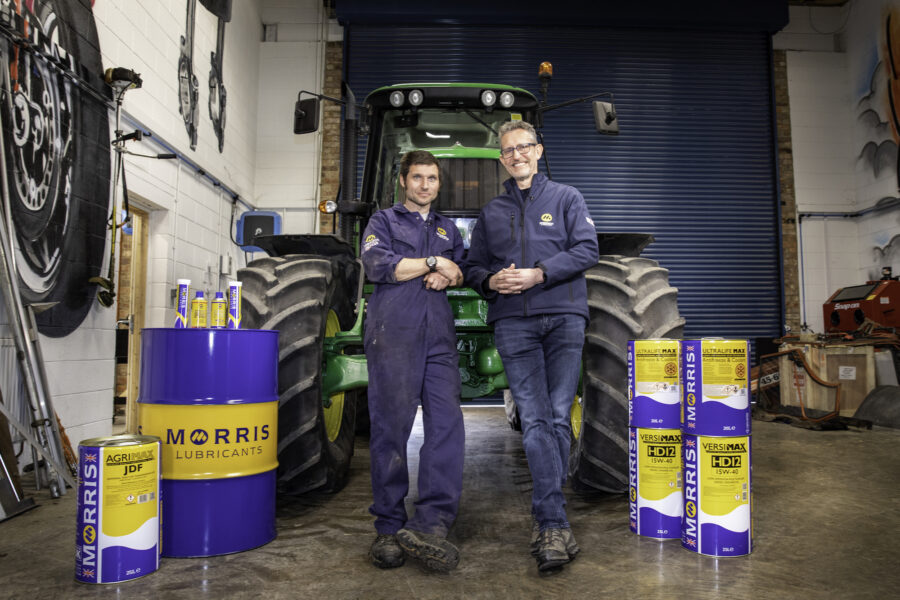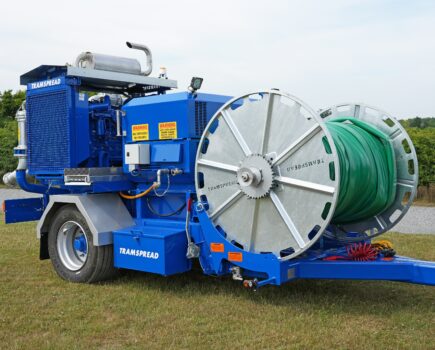Morris Lubricants is advising farmers to put oil, lubricant and grease performance ahead of price as they prepare their tractors for the new season.
With rising prices hitting the agricultural community hard, such as the steep increase in fertiliser costs having a significant impact on the sector, it can be tempting to look for short term savings elsewhere. Choosing a cheap, alternative oil to the manufacturer’s specification, at a lower price, may seem like a sound investment.
However, says Adrian Hill, Morris Lubricants’ Technology Manager, selecting the wrong, and usually, an inferior quality oil may result in significant, long-term consequences to equipment performance and in the end, an overall increase in running cost.
The company, which manufacturers the specialist Agrimax range of agricultural lubricants for a wide range of tractors, vehicles and farming equipment, has just launched a new video series with tractor enthusiast and mechanic Guy Martin, which can be viewed here. The short videos demonstrates that no matter the agricultural vehicle, equipment type, brand or model, choosing the correct oil, lubricant and grease can have a positive impact on uptime and profitability.
Adrian outlines the company’s top tips for farmers as they prepare their vehicles for the new season.
Quality first
Modern tractor engines are now designed to Stage V emissions compliance for off-highway vehicles, to meet the latest emissions legislation. These modern engines will include after treatment devices, such as AdBlue systems, diesel oxidation catalysts and diesel particulate filters, to limit harmful particulate matter and NOx emissions.
Oil choice is important. Selecting the correct, high-quality oil will more than pay for the slightly higher purchase price in the long run. For example, an incorrectly specified engine oil can block catalysts or filters, potentially leading to significant remedial costs in the region of £3,000 or more for the replacement part, plus the additional cost of the repair and downtime itself.
Service intervals
Investing in a new or modern tractor is a significant capital expense, and farmers and farming contractors need the assurance that the investment will perform reliably over many years. After the initial three-year manufacturer’s service schedule, some owners may choose to delay future servicing, but this can prove false economy.
Engine oil over time may start to degrade, causing damage to vital engine components, so it is always advisable to meet the manufacturer’s recommended service intervals.
Right oil for the right job
Some older machinery may have always operated reliably using a universal tractor oil, but modern diesel particulate filters can be sensitive to these universal oils. Instead, farmers should ensure they are using the correct oils for both the engine and the transmission (back end) systems.
Seek technical advice
Machinery downtime is not only costly but can damage reputation if stock or deliveries are affected. Seeking professional advice regarding the correct engine oil specification, or service intervals will always pay dividends.
Morris Lubricants has a dedicated team of experts on hand to provide the latest oil, lubricant and grease recommendations for a wide variety of agricultural vehicles and equipment. Whether it’s a tractor, combine harvester, mini digger, or an all-terrain vehicle (ATV), the Morris Lubricants Technical team has the appropriate solution to keep tractors and other equipment working in the field rather than stuck in the workshop.
Choose performance rather than price
Adrian concludes, “Choosing the right engine oil for the right tractor is a key part of equipment maintenance. It should be seen as a cost-effective and proactive means of protecting engine performance and ensuring equipment longevity.
“The fifth and probably the most important tip is to be guided by performance and not purchase price. This will ensure that farmers do not need to spend additional budget, at a time when costs are already at a premium, on unnecessary repair work.
“This is one of the key areas we discuss with Guy Martin in our new video series, which concludes with why engine oil quality matters.”
To view the video, please visit: https://bit.ly/3Vyagro






